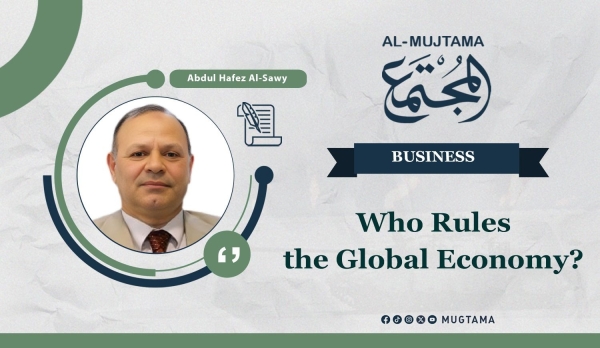Global Economic Dominance and the Prospects of Shifting Power Dynamics Featured
The 20th century was marked by the dominance of the West and America over the world's economic resources, especially since the first half of the century witnessed the deepening phenomenon of Western colonialism in many developing countries. The crime of plundering the wealth of developing nations by the West still requires rightful compensation.
At the beginning of the 1990s, a unipolar global system emerged, in which economic dominance was a key feature through globalization. This system, led by America, relied on several pillars: America's technological superiority, the accumulation of capital through possessing and achieving the highest global GDP, and control over global financial institutions, following the establishment of the World Trade Organization alongside the World Bank and the International Monetary Fund.
America has the highest GDP among all nations, reaching $27.7 trillion by the end of 2023. The European Union follows with approximately $18.5 trillion, while China ranks third with around $17.7 trillion.
How does the performance of emerging economies, particularly China, impact the American-Western monopoly over the global economy?
As for commodity trade, the European Union leads with a trade value of $14.2 trillion, followed by China at $5.8 trillion, and then the U.S. with $5.1 trillion. America's and the EU's performance is often seen as reinforcing each other, forming a bloc against emerging and developing economies.
Justifications for Change
Since the beginning of the 21st century, the global economy has undergone significant transformations. It has experienced severe financial crises, the most notable being the 2008 crisis, which was largely caused by financial conditions in America. This prompted members of the G20, along with representatives of emerging economies, to call for a reassessment of the global economic and financial system and to explore alternative currencies to the U.S. dollar for greater financial stability.
Emerging economies and some European nations have also demanded a reassessment of the role of international institutions to ensure equal footing between developing and developed countries. They advocate for policies that reflect the rise of emerging economies and necessitate changes to the existing global economic system.
Significant shifts have occurred in the global economy, including the rise of emerging economies and the establishment of institutions and entities perceived by some as potential alternatives to American and Western dominance. These institutions aim to reshape the global economic order into a multipolar system.
For instance, China, with the support of the BRICS group, established the Asian Infrastructure Investment Bank, attracting numerous emerging and developing countries, as well as some Western countries. Additionally, China has advanced its Belt and Road Initiative, implementing infrastructure projects in developing countries. Furthermore, the Chinese yuan was recognized as an international currency for financial settlements and reserve holdings in 2016.
However, the most significant development among emerging and developing countries is the BRICS bloc, which, through its periodic summits and agenda, prioritizes countering the American-Western economic and trade monopoly.
Chinese Performance Excels in Technological Advancements, Offering Hope for Independence from the West
The question that has been raised for several years, especially after the U.S.-China confrontations in trade and technology in particular, is: To what extent can the development of emerging economies, led by China, break the U.S.-Western monopoly over the global economy?
Possibilities and Challenges for Change
The intense competition between America and China, particularly in economic and technological domains, is unmistakable. America's decisions and actions against China, starting from Trump's first term, reflect fears of China's potential economic supremacy.
As a result, the U.S. imposed tariffs, threatened to withdraw American investments from China, and restricted access to technology—not just from the U.S., but also from the European Union and Japan.
Despite facing these challenges alone, without strong support from other nations, China has made remarkable progress in technology, raising hopes of achieving technological independence from the West and America. This is evident in China's advancements in artificial intelligence—not only in technical capabilities but also in terms of significantly lower costs compared to American offerings. This suggests that America and the West have been reaping excessive profits for over a century for the technology they provided to the world.
Another crucial area where China and emerging economies must challenge America is financial and monetary policy control, particularly regarding the dominance of the U.S. dollar in global trade and financial transactions, as well as the impact of U.S. interest rates on global economic conditions.
Using Local Currencies for Trade Settlements within BRICS and with Other Countries Reduces Dollar Dependence
For over a decade, BRICS nations have taken steps to counter America's financial and monetary dominance, including the use of local currencies in trade settlements among BRICS members and other nations, thereby reducing reliance on the dollar. They have also proposed creating an alternative global currency, an idea of great significance, as evidenced by Trump's extreme reaction—threatening to impose 100% tariffs on countries that replace the dollar in their international transactions.
To be effective, emerging and developing economies, whether within BRICS or beyond, must coordinate and integrate their efforts. A potential second Trump presidency could provide a greater opportunity to form a larger front against America, as Trump's policies also target the European Union. This could lead to a historic shift in the EU's relationship with America, possibly aligning the EU with emerging economies and BRICS.
International relations are fundamentally interest-driven. These relations strengthen when all parties involved benefit equally or in closely aligned ways—something that Trump's policies, which exacerbate trade wars and impose neo-colonial economic measures, prevent.
If emerging and developing economies succeed in expanding trade and financial transactions independent of America and the West, it could lead to their increased share in the global economy and gradually isolate America and the West. Within a few decades, this could result in a truly multipolar economic system.
Read also: Insights into International Economic Relations Governing the World
-------------------------------------------------------------


